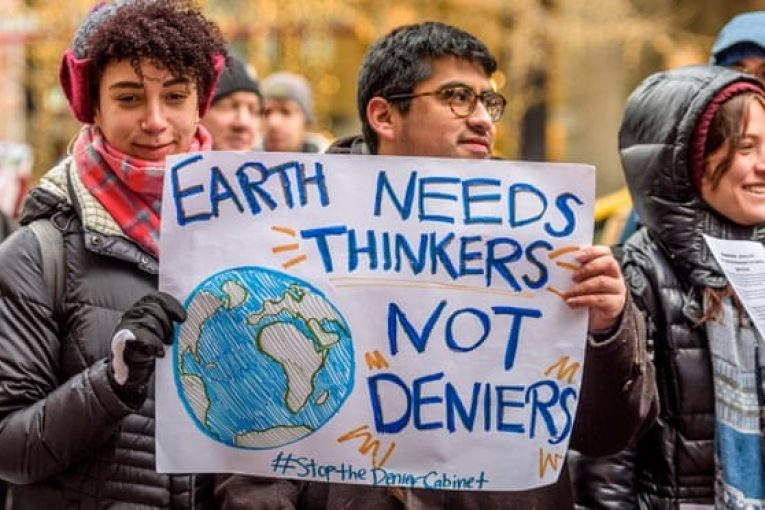

By The Vanguard Staff
HELENA, MT – The court here, in what is being billed as the first-ever real “climate trial,” was asked by an attorney this week for 16 youthful plaintiffs to “strike down as unconstitutional a Montana law that prohibits state agencies from considering the environmental effects when it weighs permits allowing the release of greenhouse gases,” according to the San Diego Union-Tribune.
Attorney Nate Bellinger made his closing argument at the end of a seven-day trial after the plaintiffs state officials violated their right to a clean and healthful environment, part of the Montana Constitution, by allowing companies to build power plants and expand coal mines, among other things.
“Like other monumental constitutional cases before, the state of Montana comes before this court because of a pervasive systemic infringement of rights,” Bellinger said.
During the first-of-its-kind trial, plaintiffs testified that increased heat, smoke from wildfires and drought affect their activities and mental health. Native Americans said climate change affects their ceremonies and traditional food sources, and climate experts warned the window to address the environmental damage is rapidly closing, said the Union-Tribune.
Judge Kathy Seeley is expected to take several weeks to rule.
The case was filed in March 2020 by 16 young Montana residents, then aged two through 18. They allege the state’s government’s pro-fossil fuel policies contribute to climate change, and violate provisions in the state constitution that guarantee the “state and each person shall maintain and improve a clean and healthful environment in Montana for present and future generations,” said The Guardian account.
“Plaintiffs are asking this court to declare that a stable climate system is fundamental to the protection of their rights to clean and healthful environment,” said Bellinger, an attorney representing the plaintiffs with non-profit law firm Our Children’s Trust.
The San Diego newspaper account explained, “Montana Assistant Attorney General Michael Russell said in the state’s closing Tuesday that the climate change issue is much larger than Montana can address on its own.
“He said calls by the plaintiffs for the state to take the lead in addressing climate change was a social statement, not a legal argument. The case put on by the young plaintiffs was a ‘weeklong airing of political grievances that properly belong in the Legislature, not a court of law.’”
The Guardian reported the suit targets “a provision in the Montana Environmental Policy Act which prevents the state from considering how its energy economy may contribute to climate change. In 2011, the legislature amended the law to prevent environmental reviews from considering ‘regional, national or global’ environmental impacts—a provision the original complaint called the “climate change exception.”
Montana’s legislature amended the provision to specifically ban the state from “considering greenhouse gas emissions in environmental reviews for new energy projects. The state’s attorneys said that should have rendered the lawsuit moot, but Seeley, of the first district court in Montana rejected them,” said The Guardian, adding “Montana regulators who were called as expert witnesses for the defendants said they merely enforce state laws.”
The San Diego News-Tribune quoted Plaintiff Lander Busse saying he was optimistic the court would “would rule in their favor, adding he hoped the plaintiffs’ case would spark ‘a trickle down of other litigation and activism nationally.’”
“If Seeley sides with the plaintiffs and declares the state law unconstitutional, it would be up to the Republican-led legislative and executive branches of Montana government to respond. Representatives of Gov. Greg Gianforte’s administration indicated during the trial that there is no basis under state law for rejecting permits for projects, even if their climate impacts are disclosed,” said the San Diego news account.
A ruling for plaintiffs could increase political pressure on state officials, but it would not have any immediate consequences, said James Huffman, a former professor and dean emeritus at Lewis & Clark Law School, adding, “Republicans in Montana seem pretty fixed in their ways, and I don’t think a decision by this district court is going to change the way that they think about these issues.”
“Seeley has said in previous court orders that she would not directly order officials to create a new approach to addressing climate change, but that if the challengers successfully make their case, she will issue a ‘declaratory judgment’” that officials violated the state constitution, said The Guardian.
The Guardian added, “Throughout last week, expert witnesses for the plaintiffs, including climate scientists and ecologists, explained that to ensure a stable climate system and livable future, the concentration of carbon dioxide in the atmosphere must be reduced to no more than 350 parts per million by 2100 – something the defendants have not argued against.
“This court should declare 350 parts per million is the constitutional standard necessary to protect a stable climate system,” said Bellinger in his closing argument.
Emily Flower, a spokeswoman for Attorney General Austin Knudsen, described the trial in a Guardian story as a “publicity stunt staged by an out-of-state organization that is exploiting well-intentioned children.”
The Guardian said Our Children’s Trust, an Oregon environmental group, has “filed similar lawsuits in every state since 2011 and raised more than $20 million in contributions. None of the previous cases had reached trial.”
“Anyone who has any questions about the legitimacy of the plaintiffs’ claims wasn’t listening at trial last week,” Julia Olson, the group’s founder, said in response to Flower’s statement. She noted that the evidence presented by the young people and by scientists for the plaintiffs was largely uncontested by the state’s attorneys.
“The trial has shown the facts are irrefutable,” Olson said in numerous news reports.